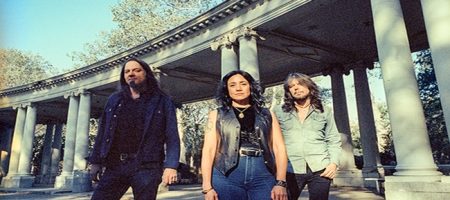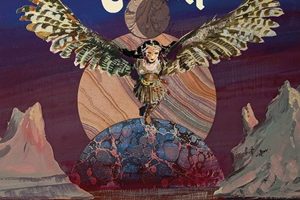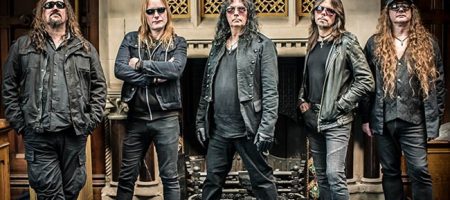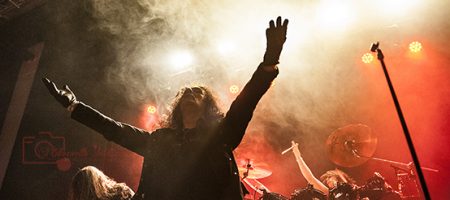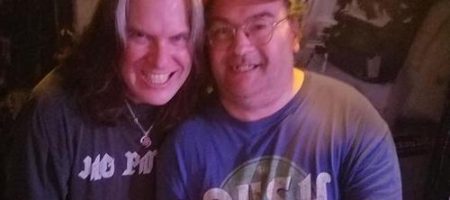Satan – Conjuring Magic
Friday, 31st August 2018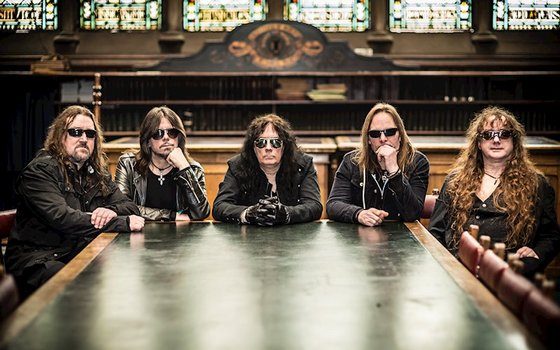
In the metal realm, rarely do consumers give bands a second chance to make that indelible impression. Satan became one of those latter day British victims of releasing a record at the tail end of the NWOBHM movement – but do not sleep on the killer songs contained for their debut Court in the Act from 1983. Resurrecting for festival show offers in 2004 and 2011, they finally got charged up enough to record new material. For this scribe’s money, it’s hard to argue the quality output with the latest two studio platters Life Sentence and Atom by Atom – keeping the same raw spirit and speed/energy on point, bristling with that same finesse and focus that make them standouts even today.
Now signing to Metal Blade for their newest full-length Cruel Magic, the band isn’t rocking the boat as far as the formula – churning out as primal a record as you can expect, aiming for as live a vibe as possible. Reaching out via Skype to guitarist Steve Ramsey, he seems pleasantly surprised by the worldwide buzz surrounding the band these days. Read up on the new label deal, their relationship with their cover artist, thoughts on new bands versus veteran bands as far as the studio – and even some comedian talk.
Dead Rhetoric: Cruel Magic the latest Satan album sees the band stepping up to Metal Blade after releasing two studio albums and one live record for Listenable Records. Would you say it is business as usual for Satan – and how do you feel about gaining a bigger foothold for promotion/ distribution given Metal Blade’s history and legacy?
Steve Ramsey: I think it’s great. When we signed with Listenable we had a bit of a joke of it, because they wanted to sign us for three albums and we said there was no way we were going to do that, we were going to be lucky to do one album. He insisted on signing us for two, and with everything that has happened with all the gigging for the band, it’s been fantastic. We did the two albums, and the live album based on the US tour that we did so the label was able to give us an extra little advance for that. Before we knew it, we had recorded the two albums and we were free. We had a lot of other labels interested- when we made the first new demo, two labels became interested. Only Listenable and High Roller were interested in us. Now with everything that has happened with us, now everyone is interested in us.
We were very happy with Listenable Records, but especially for the states they didn’t have what we wanted. We were doing well in the states, and we wanted a better outlet for the fans to be able to get the albums and a bit more promotion. Metal Blade is a big famous label – we all remember them from their days with Slayer, they got their start there. We knew about the legacy, it’s a much different ball game now as we’ve done a video and we didn’t have that in the contract for Listenable. It’s been fantastic, we are really looking forward to the album coming out.
Dead Rhetoric: How did this set of material come together? At this point in the band’s career, is songwriting an easy or tedious process, and were there any difficulties or surprises that came up during the songwriting and recording of the new record?
Ramsey: It’s easy. We don’t stop writing, we just keep writing as we go. This album was put together with material that we developed straight after the last one. The first song on the album “Into the Mouth of Eternity” was kind of ready on the last album, but we weren’t exactly happy with it so we tweaked it a little bit to make this one. A couple of riffs and ideas we had before the last album. We aren’t finding it difficult to write because we spent such a long time not doing it.
We spent a lot more time rehearsing this material – and we spent a lot more time on the lyrics. We think that’s where this album is a bit stronger, especially with the lyrics. We wanted to put more effort into what we were writing about. Half of the album is recorded live- and if listeners listen carefully, especially if they are musicians, they will hear that we left a few mistakes in there on the recording because we wanted that feeling of it just being played. Basically this is how we recorded Court in the Act – it was such a low budget album, basically if we could play the song from start to finish and if it hadn’t fallen apart, that was the take that went on the album (laughs). We kind of wanted that vibe on this one as well, and we left some of that factor in.
Dead Rhetoric: It seems like you also make a conscious effort to keep the production values natural and down to earth, is that fair to say?
Ramsey: Right from the start we want the record to sound like we do live. We don’t want to polish it up and make it sound big, so that when you listen to it live it doesn’t sound as polished. We wanted it to sound like you’ve come down to the band’s rehearsal, and seeing it in the rehearsal room. It’s exciting and it sounds all in your face, I think that we’ve achieved what we set out to do.
Dead Rhetoric: Do you believe there are specific characteristics that define an ideal riff, melody, or combination of ideas to develop into a Satan song?
Ramsey: It’s difficult because with the five of us, you can write a riff on the guitar and by the time everybody’s put their feel onto it, it metamorphizes into something different. We start hearing what else could go with it- we try the riffs out in the rehearsal room and that gives the ideas to write more riffs for that song. It comes together like that.
Dead Rhetoric: Are the lyrics in development at the same time as the music- or are they worked on separately?
Ramsey: Sometimes we have ideas of the subject matter that we’d like to write about ahead of time. But definitely it comes from the music first- the melody lines are written after to go on top of the music.
Dead Rhetoric: Eliran Kantor once again developed the cover art for this record – what do you enjoy regarding his work for the band, and how did this specific piece come about?
Ramsey: It’s just unbelievable what he’s done. He takes our breath away every time. The first album he did, we gave him the title of the album and that we needed the judge, we had a rough idea of what we wanted. The second album, we just gave him two song titles, and he came with the idea for the last sleeve. His idea was nothing that we guided him towards, it was just how the titles and the music made him feel. “Atom by Atom” is about someone that has Alzheimer’s, and his idea of… it was a quite personal thing for him, as he had a family member suffer from that as well. He came up with the artwork directly from his feelings, and the same for this album – we gave him two song titles again, and one of them was “Cruel Magic”.
Even though the lyrics for “Cruel Magic” are more about black magic and invoking things, don’t mess with stuff unless you want to really see what the results are – it’s playing with that idea of revenge, is it really what you want to be doing. He came up with a totally different twist and angle on it – the witches drowning, the cruelty of how they use to pursue the witches. When Russ and I got the first look at the artwork, we thought it should be hanging in an art gallery, it shouldn’t be an album sleeve. It was that good- he’s like a band member now, he’s feeding off our ideas to be able to come up with his own ideas. It’s not like hiring someone to do an outside job- he’s a part of this and it’s a fantastic thing.
Dead Rhetoric: Tell us about the video concept and shoot for “The Doomsday Clock” – did you intentionally go for kind of a black and white, old school feel, and how do you believe things turned out?
Ramsey: Again, we didn’t have a lot of ideas. The director of the video company came up with the idea. We found the setting for it, it’s a mining institute, a bit of a Harry Potter place with the big bookshelves and the stained-glass windows. We came up with that room, but we didn’t have much of an idea of what was going to happen. He listened to the song, and the way he saw things was us moving into the camera all of the time. The black and white idea came up, it was first filmed in color and then he sent us the black and white version and asked us if we liked that better, and we all agreed that was the better version. Low budget, but a great job done again.
Dead Rhetoric: Considering this is your first video you’ve ever done, do you feel there is as much importance for this medium through social media compared to the earlier days of music television?
Ramsey: I think very much so. A lot of people listen to music on platforms like YouTube and stuff like that. If I want to look for a band, I do that- first thing I will do is look on YouTube. Especially if somebody gives me the name of a band or a song title, that’s what I’ll do. It’s important to have that outlet for the band as well. Plus there is still the odd television show that you can get more airplay on when you’ve got a video. I wouldn’t say it’s absolutely imperative to do in today’s market, but it helps.
Dead Rhetoric: Discuss the balancing act you have with Satan on playing tricky material while also keeping things full of soul and passion – are there times where you dial things back so that one doesn’t supersede the other?
Ramsey: Yes. Sometimes we feel like we are pushing things a bit too hard, and other songs we feel like pushing ourselves to the limit. We feel like that as we carry on as a band, that’s what we are doing on the records. As long as we are enjoying it, and the ideas that we are coming up with, it’s all good.
Dead Rhetoric: What makes for the ideal outcome from a Satan live performance?
Ramsey: I think the theme of the band when we play live is energy. I don’t think a lot of bands have the same kind of impact and energy that we have live. There’s a special chemistry between us that works really well. I think you can hear that, and especially with this record you can hear that half the record is first takes- we didn’t spend a lot of time recording at all, not a lot of overdubs. The drums sound like Sean’s drums, the guitars sound like our guitars, if you walked into the rehearsal room, there’s no triggers, nothing is treated, no extra keyboards – it’s just the way we sound and play. We try to represent the records in that same kind of vibe, it’s exciting. When you come to a Satan gig, it has that kind of excitement.
Dead Rhetoric: Being a veteran of the metal scene, where do you see the major differences between the early generations of bands and the younger artists trying to make their mark today?
Ramsey: I think more of it has to do with the way that we record now. I teach, that’s what I do outside of playing in a band, and I teach young musicians and they seem to think you have a recording platform like ProTools, that you only have to play three or four drum beats, four or five notes in a computer. The old bands practiced more and became better musicians because they had to perform the songs in the studio – they couldn’t fix them up like they can now. You can play a drum part now, have a couple of parts out of beat, and fix them in a computer. I’ve noticed there’s a difference between how the younger generation thinks about that and the older generation – the younger ones think it will be fine, they’ll fix it in the mix. The bands in the 70’s we were brought up on, they were great players – Judas Priest, Rush, all those kinds of bands. They were great musicians because they had to be.
Dead Rhetoric: Do you also believe this is a dangerous outlook, because it’s bled over into the live market where bands are using tons of samples, triggers, computers, backing tracks?
Ramsey: Yeah, we’ve even done it ourselves (laughs). On the last album, the big song at the end for “The Fall of Persephone” there were some big choir vocals that we’ve had to put on a backing track to play it live because it drops out otherwise. A little bit of that stuff is okay, but not when it’s the main part of your sound- then it becomes a problem. All the new technology is great and we should embrace it all, but at the same time we need to think about why we need it.
Dead Rhetoric: You’ve mentioned in a previous interview a love of comedy and going to comedy clubs when you have free time to relax. Who are some of your favorite comedians, and what do you look for in that arena that makes someone stand out above others?
Ramsey: A lot of the comedians I like are good at improvisation. They go off on a tangent and improvise, and the ones that can talk to you for an hour and a half about a variety of subjects and then tie them all together at the end very cleverly. I like a lot of political comedians too. There’s a guy called Ross Noble, and he’s from Newcastle- he’s one of my favorite comedians. He just starts the show and he goes off on a tangent, then makes up the show with members of the audience and he’s improvising all the time. I think it’s a fantastic skill to have.
He actually… we realized a few years later, in fact it was my daughter was mentioning something about the fact that when he was younger, he rode a unicycle. We had done a video where we hired some people with Skyclad, my other band. In the early 90’s we did a video for “Thinking Allowed”, we hired in some students who were acting as circus performers. We have him in one of our videos actually riding the unicycle (laughs). We didn’t realize until twenty years later, we were like ‘wow, that’s Ross Noble in the video’. My daughter tweeted it, and he tweeted back at her saying, yeah I was in the video. She thought that was the coolest thing that’s ever happened, she’s not into the loud music but that sold her and got Dad some brownie points.
Dead Rhetoric: Looking at your long career, what do you consider a couple of the special standout moments that stay forever embedded in your brain and body?
Ramsey: There are so many of them with both bands. Playing festivals like Hellfest, I remember the first time we went to Chile with Satan, that was 4-5 years ago. We never thought that we would go to places like Japan, or the United States- and now we’ve been to the states three or four times, we’ll be going back again in October. A dream come true. We spent a lot of time in the 80’s with Satan just dreaming about that, and it never happened, and we split up. To come back and have that happen for the band, it’s just been unreal.
Dead Rhetoric: Are you surprised by this rebirth and re-ignition of the NWOBHM this many years later?
Ramsey: I kind of get what it is. I think it’s like a back to basics things. People are starting to get tired of hearing clicky bass drums and tuned down guitars. We bring back a standard tuning of the guitars, and more melody in the music. We didn’t ever try to take the melody out of the music. We wanted to play fast and exciting music, but very melodic. A lot of the new bands around, they’ve got no rock and roll in them. All the bands that we were brought up upon in the 1970’s, they have rock and roll in them. Whether they were a metal band or a rock band, they all had some rock and roll going on- you felt that passion in the music.
Dead Rhetoric: What’s on the horizon for Satan over the next twelve months to support this new record?
Ramsey: An American tour, some dates in Germany in October. When we tour America, we are going to do the West Coast as well as some of middle America – normally we do them in two different lots, but we are going to do ten shows across the board this time. We will come back again in 2019. We want to do some headline shows in Germany – we tend to play so many festivals that it hasn’t come about for us to do headlining. We are being booked up to the end of February 2019 so far- we will see what comes up to for festivals next year just to keep promoting the album.
Skyclad- same thing again. We have a new video out, we are going to try to book some more shows, we are going back to Greece next April. And there are a few other things in the pipeline.











